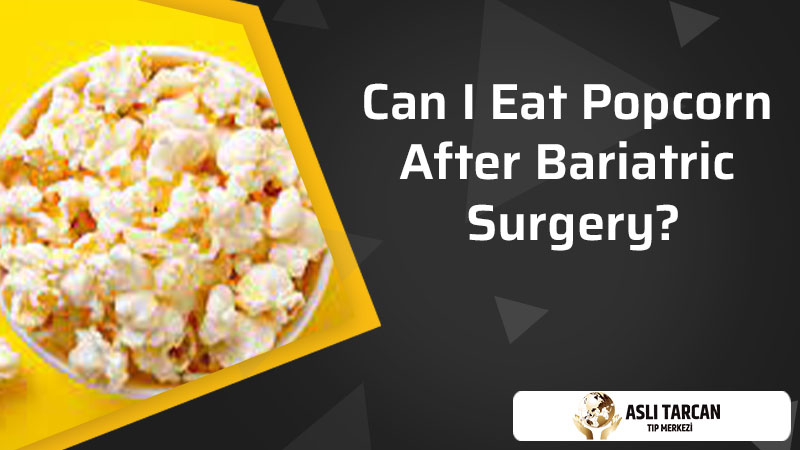Can I eat popcorn after bariatric surgery is a very popular question for those who have weight loss surgery or think about to have? People after bariatric surgery should be careful while eating. Generally, surgeons lead you to see a dietitian in order to build a healthy diet. Although your surgery itself help you lose weight; however, you should take care of your body through healthy nutrients. Actually, popcorn is not unhealthy in contrast it is filling. However, it is solid food which may be difficult for you to digest. You may eat popcorn with small portion end of a meal. This habit prevent you overeat and you will have eaten nutritious foods firstly.
Can I Eat Popcorn After Bariatric Surgery?
The answer of can I eat popcorn after bariatric surgery is yes but limited amount and at the end of a meal. Instead of popcorn you can prefer most nutritious foods which contribute your daily diet. Previous eating disorder may courage you to eat a lot but actually, bariatric surgery prevents you to eat much. Nevertheless, it will be good if you care about not eating too much. You should reduce your portion and also you should avoid chewing quickly. In other words, you have to reverse your eating habit with a healthy one.
Along with eating habit you should do exercise which helps your saggy skin to recover. You can strength your skin texture with workouts; however, you should avoid strenuous activities. Your surgeon recommends you some important points which are essential for post-op care related to exercise.
To sum up, if you do your post-op care precisely the result of your weight loss surgery will be much better.
Can You Eat Popcorn or Other Solid Foods After Weight Loss Surgery?
While learning about can I eat popcorn after bariatric surgery, you can find many recommendations. Actually, bariatric surgery can offer you a healthy life, nevertheless, you should build a healthy life through eating and drinking. After a weight loss surgery, it does not mean that you can eat what you want. In contrast, you should be careful much more than before because, your body system changes. Your body is not the same as before its digestion system is not the same anymore. After getting a weight loss surgery, you should avoid for lifelong eating sugary or sweetened foods such pastries. On the other hand, you should not drink what you want such as alcohol, sugary juices or soda. These nutrients can be delicious but they are harmful for everyone. Not only people who had gastric sleeve but whole people should avoid consuming hazardous foods. Each of them may cause intoxication and also may cause to gain weight again. Additionally, they may slow to lose weight; because of that your weight loss journey may last for years.
You may be a fan of popcorn so you wonder that can I eat popcorn after bariatric surgery. To know about foods’ calories can give you idea about themselves. In other words, high calorie foods such as bacon, sausage, hard cheeses, whole milk, and butter can be an obstacle to lose weight. In addition, junk foods with empty calorie like potato chips, chocolate bars, candies may reduce effect of your surgical procedure. Also, avoid eating tough meats and jerky, dry foods, breads, pastries
Rice, pasta, and raw fibrous vegetables like carrots, broccoli, corn, cabbage and celery. You should also avoid drink soft drinks and sodas, alcoholic beverages, caffeinated beverages which increase blood sugar level.
What Kind Of Snacks Can I Eat After Gastric Sleeve?
While you searching for answer of can I eat popcorn after bariatric surgery, you may wonder suitable snacks. Firstly, you should know that these foods written here cannot replace your surgeon’s recommendation. However, by asking your surgeon you may consume some of snacks such as sugar-free nutrition shakes. Also, instant breakfast drinks can be innocent. Protein rich diet can help you to decrease your body weight and strength your muscles. So, shakes made with protein powder can be an option for you. Soups generally are good for stomach and also starting a meal with soup prepares your stomach for other nutrients. You can prefer to eat thin broth and cream-based soups with no chunks. Some soup noodles in very small amount are acceptable.
Typically corn contains sugar so, the answer of can I eat popcorn after bariatric surgery may yes but very little amount; otherwise, you cannot lose weight properly. On the other hand, you may love drinking milk; it is okay if you drink unsweetened milk. Additionally, foods made with milk are also okay to eat such as sugar-free, nonfat pudding, nonfat frozen yogurt, ice cream and sorbet.
As you can see, a person who had bariatric surgery should avoid sugary snacks or he has to consume them a small amount.
For The First 2 Weeks Post-Surgery
Can I eat popcorn after bariatric surgery can be a leading question. Eating habits should be changed after getting a weight loss surgery. Gastric sleeve or any weight loss surgery is related to digestion system; it is important to protect digestion system with a healthy diet. Avoid eating anything solid is the first rule because, stomach is vulnerable immediately following surgery. At least for the first two weeks, it is a necessity to consume liquids. Many surgeons’ midpoint is to let stomach to get some rest through not to eat solid foods.
Can I eat popcorn after bariatric surgery? This question brings you here to find out some tips about after bariatric surgery care. Actually, avoiding to consume popcorn, red meats, overcooked leaner meats, raw vegetables and fresh fruits are really important. You may try to minimize consumption of them but you should consult your surgeon. Foods which are tough to digest may harm your stomach. Instead of add them into your daily meal you may take advice from your dietitian.
Mushy food phase comes after liquid phase because, your body needs more nutritious foods. Mushy foods can be tuna, egg salad, light fish, lean poultry, tofu and canned vegetables.
By doing that step by step you prepare your stomach for solid food but of course, your stomach needs time to prepare itself to digest them after a weight loss surgery.
Post-Surgery Questions: When Can I Eat Pasta After Gastric Sleeve?
If you’ve recently had gastric sleeve surgery, you may be wondering, “when can I eat pasta after gastric sleeve surgery?” While pasta can be a part of a healthy diet after gastric sleeve surgery, it is important to wait until your body has healed and you have been cleared by your doctor. Most people who have undergone gastric sleeve surgery are able to start eating pasta after a few months post-surgery. However, the timing will depend on how quickly your body recovers from the surgery for weight loss and the advice of your doctor.

When you do start eating pasta again, take small bites and chew thoroughly. You should also avoid sauces that are high in fat or sugar. It is also important to pay attention to portion sizes as eating too much pasta can cause stomach discomfort or even nausea. It is also recommended to avoid certain types of pasta, such as fresh or homemade pasta, which can be difficult to digest due to their texture. Remember to listen to your stomach and observe how it reacts to the food you’re consuming. For more information on what to expect after gastric sleeve and questions like, “when can I eat pasta after gastric sleeve surgery?”, reach out to the clinic.



